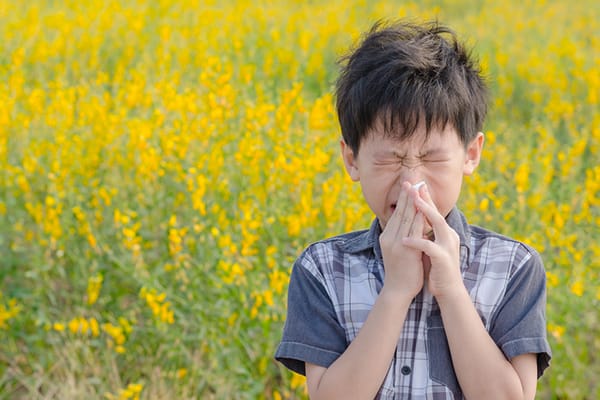For people with seasonal allergies, spring doesn't have the same allure as for non-allergy sufferers. That's because wind-borne pollens can cause hay fever, also known as allergic rhinitis, which can lead to fatigue, headache, sneezing, sniffling, itchy eyes, rash, or asthma symptoms. If you're among the 25 million Americans with seasonal allergies, your best line of defense is to begin a regimen of medication before the buds are in full bloom.
4 Ways to Manage Allergy Symptoms:
1. Know what you're allergic to
Some of central Iowa's biggest offenders are elm, cottonwood, and river birch trees. But there are many other pollinating plants, weeds, trees, and molds that can be the source of problems.
Skin-prick tests can be one of the most accurate ways to identify specific allergies. These involve injecting tiny tidbits of proteins just beneath the skin's surface and watching to see how the skin reacts.
2. Avoid your triggers
Some good avoidance tactics:
- When pollen counts are high, stay indoors with the windows closed and air conditioning turned on.
- Use high-efficiency filters on your heating and cooling system; a dehumidifier to keep air dry, and a portable high-efficiency particulate air (HEPA) filter in your bedroom.
- Delegate outdoor chores or, if you must do them yourself, wear a pollen mask and gloves.
- Change clothes after being outdoors; shower to rinse pollen from your skin and hair.
3. Know when — and what type of — medications will help you.
Your nose acts as the ignition keyhole for your body. As soon as you breathe in pollen, the allergy engine starts. Now, think of medications containing antihistamine as chewing gum that blocks the keyhole; pollen can't get through to start the engine.
If you wait to start medication until allergy symptoms begin, it could be too late — the engine has already started. The reaction has to run its course, which usually takes three days from the time of exposure.
When allergy symptoms kick in, decongestants may help. Although many OTC treatments are very effective, individuals with more severe allergic reactions may need a prescription medication or allergy shots, also called immunotherapy.
4. Avoid foods that aggravate symptoms.
About one-third of people with seasonal allergies also experience itchy mouth, lips, and throat, or sniffling and sneezing after eating certain foods. This is called “oral allergy syndrome,” which means the immune system sees a similarity between the proteins in pollen and those in the food, prompting an allergic response.
For example, ragweed and watermelon have very similar chemical structures. If you're allergic to ragweed, eating watermelon could exacerbate symptoms. The same is true with birch trees and apples.
If cooking or peeling the food doesn't eliminate symptoms, avoid it altogether or see your allergist for other options.
Do Nature-Based Remedies Work?
For mild allergies or as a supplement to traditional allergy medicines, some studies suggest that nature-based products may provide a degree of relief. There's no harm in trying home remedies. If they help, great. If not, it's nice to know other treatment options are available.
Butterbur (Petasites hybridus). One study reported that one tablet of this European herb taken four times a day helped control symptoms of hay fever. Another study showed that it reduced symptoms of grass allergy.1
Quercetin. This flavonoid compound is available as a nutritional supplement and may help squelch the release of histamine and other chemicals that initiate the allergic response.1
Grape seed extract. Taken from whole grape seed, this nutritional supplement may boost immunity and lessen allergy symptoms, especially when used in combination with vitamin C.1
Locally grown honey. Although eating local honey is probably not going to help with oak, ragweed, or juniper tree allergies, one limited study found that people who were allergic to birch pollen who ate honey with birch pollen were better able to control their allergy symptoms.2
You should always consult with your doctor before using any herb, especially if you have an existing health condition, are pregnant, use a hormone therapy, or take other medications.
Which Over-the-Counter Medicine?
Antihistamines work best when taken regularly, beginning a couple of weeks before symptoms typically begin. Antihistamines block histamine, a symptom-producing chemical released by the immune system after exposure to an allergen. In pill form, antihistamine helps reduce itching, sneezing, and runny nose. Nasal sprays help relieve an itchy or runny nose, postnasal drip, and congestion. Non-drowsy formulas include Allegra® and Claritin®.
Decongestants help reduce the fluid in the lining of the nose, which relieves swollen nasal passages and congestion. Available in pill, liquid, and nasal sprays. Because long-term use of nasal decongestants can actually worsen allergic symptoms, they should not be used for more than three days.
Combination antihistamine/decongestants include Allegra-D®, Claritin-D®, and Zyrtec-D®.
If OTC medications don't provide adequate relief, your allergist may recommend:
Prescription-strength antihistamines, decongestants, or corticosteroids, which help prevent the release of symptom-causing chemicals during an allergic reaction.
Allergy shots, also called “immunotherapy,” provide relief from persistent allergies that don't respond to medication or when those medications cause undesirable side effects. They are typically given on a regular schedule over three to five years and build up the body's tolerance to the offending allergens. Allergy shots are not effective in individuals with food allergies.
Can You Grow Out of Your Allergies?
In a word, no. Allergies are coded into a person's genetic make-up — if you are born with the “allergy gene,” that will never change. However, weather patterns and other factors can change how severely seasonal allergens affect you.
Because allergies are a genetic disease, they tend to run in families. If one parent has allergies, there's 25 percent chance children will as well. The odds double when both parents have allergies. Understanding your allergy triggers is the first step in effectively managing them.
For more information, contact The Iowa Clinic ENT Department at 515.875.9450.


